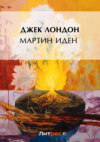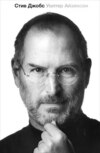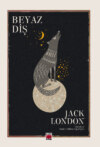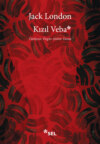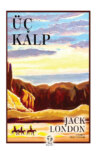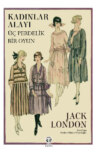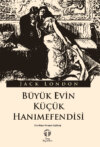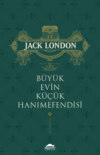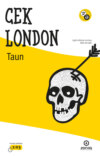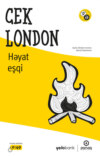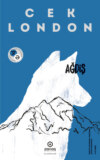Kitabı oku: «Мартин Иден / Martin Eden», sayfa 10
But she was too busy in her mind, carving out a career for him that would at least be possible, to ask what the ultimate something was which he had hinted at. There was no career for him in literature. Of that she was convinced. He had proved it to-day, with his amateurish and sophomoric productions. He could talk well, but he was incapable of expressing himself in a literary way. She compared Tennyson, and Browning, and her favorite prose masters with him, and to his hopeless discredit. Yet she did not tell him her whole mind. Her strange interest in him led her to temporize. His desire to write was, after all, a little weakness which he would grow out of in time. Then he would devote himself to the more serious affairs of life. And he would succeed, too. She knew that. He was so strong that he could not fail-if only he would drop writing.
“I wish you would show me all you write, Mr. Eden,” she said.
He flushed with pleasure. She was interested, that much was sure. And at least she had not given him a rejection slip. She had called certain portions of his work beautiful, and that was the first encouragement he had ever received from any one.
“I will,” he said passionately. “And I promise you, Miss Morse, that I will make good. I have come far, I know that; and I have far to go, and I will cover it if I have to do it on my hands and knees.” He held up a bunch of manuscript. “Here are the ‘Sea Lyrics.’ When you get home, I’ll turn them over to you to read at your leisure. And you must be sure to tell me just what you think of them. What I need, you know, above all things, is criticism. And do, please, be frank with me.”
“I will be perfectly frank,” she promised, with an uneasy conviction that she had not been frank with him and with a doubt if she could be quite frank with him the next time.
Chapter XV
“The first battle, fought and finished,” Martin said to the looking-glass ten days later. “But there will be a second battle, and a third battle, and battles to the end of time, unless-”
He had not finished the sentence, but looked about the mean little room and let his eyes dwell sadly upon a heap of returned manuscripts, still in their long envelopes, which lay in a corner on the floor. He had no stamps with which to continue them on their travels, and for a week they had been piling up. More of them would come in on the morrow, and on the next day, and the next, till they were all in. And he would be unable to start them out again. He was a month’s rent behind on the typewriter, which he could not pay, having barely enough for the week’s board which was due and for the employment office fees.
He sat down and regarded the table thoughtfully. There were ink stains upon it, and he suddenly discovered that he was fond of it.
“Dear old table,” he said, “I’ve spent some happy hours with you, and you’ve been a pretty good friend when all is said and done. You never turned me down, never passed me out a reward-of-unmerit rejection slip, never complained about working overtime.”
He dropped his arms upon the table and buried his face in them. His throat was aching, and he wanted to cry. It reminded him of his first fight, when he was six years old, when he punched away with the tears running down his cheeks while the other boy, two years his elder, had beaten and pounded him into exhaustion. He saw the ring of boys, howling like barbarians as he went down at last, writhing in the throes of nausea, the blood streaming from his nose and the tears from his bruised eyes.
“Poor little shaver,” he murmured. “And you’re just as badly licked now. You’re beaten to a pulp. You’re down and out.”
But the vision of that first fight still lingered under his eyelids, and as he watched he saw it dissolve and reshape into the series of fights which had followed. Six months later Cheese-Face (that was the boy) had whipped him again. But he had blacked Cheese-Face’s eye that time. That was going some. He saw them all, fight after fight, himself always whipped and Cheese-Face exulting over him. But he had never run away. He felt strengthened by the memory of that. He had always stayed and taken his medicine. Cheese-Face had been a little fiend at fighting, and had never once shown mercy to him. But he had stayed! He had stayed with it!
Next, he saw a narrow alley, between ramshackle frame buildings. The end of the alley was blocked by a one-story brick building, out of which issued the rhythmic thunder of the presses, running off the first edition of the Enquirer. He was eleven, and Cheese-Face was thirteen, and they both carried the Enquirer. That was why they were there, waiting for their papers. And, of course, Cheese-Face had picked on him again, and there was another fight that was indeterminate, because at quarter to four the door of the press-room was thrown open and the gang of boys crowded in to fold their papers.
“I’ll lick you to-morrow,” he heard Cheese-Face promise; and he heard his own voice, piping and trembling with unshed tears, agreeing to be there on the morrow.
And he had come there the next day, hurrying from school to be there first, and beating Cheese-Face by two minutes. The other boys said he was all right, and gave him advice, pointing out his faults as a scrapper and promising him victory if he carried out their instructions. The same boys gave Cheese-Face advice, too. How they had enjoyed the fight! He paused in his recollections long enough to envy them the spectacle he and Cheese-Face had put up. Then the fight was on, and it went on, without rounds, for thirty minutes, until the press-room door was opened.
He watched the youthful apparition of himself, day after day, hurrying from school to the Enquirer alley. He could not walk very fast. He was stiff and lame from the incessant fighting. His forearms were black and blue from wrist to elbow, what of the countless blows he had warded off, and here and there the tortured flesh was beginning to fester. His head and arms and shoulders ached, the small of his back ached,-he ached all over, and his brain was heavy and dazed. He did not play at school. Nor did he study. Even to sit still all day at his desk, as he did, was a torment. It seemed centuries since he had begun the round of daily fights, and time stretched away into a nightmare and infinite future of daily fights. Why couldn’t Cheese-Face be licked? he often thought; that would put him, Martin, out of his misery. It never entered his head to cease fighting, to allow Cheese-Face to whip him.
And so he dragged himself to the Enquirer alley, sick in body and soul, but learning the long patience, to confront his eternal enemy, Cheese-Face, who was just as sick as he, and just a bit willing to quit if it were not for the gang of newsboys that looked on and made pride painful and necessary. One afternoon, after twenty minutes of desperate efforts to annihilate each other according to set rules that did not permit kicking, striking below the belt, nor hitting when one was down, Cheese-Face, panting for breath and reeling, offered to call it quits. And Martin, head on arms, thrilled at the picture he caught of himself, at that moment in the afternoon of long ago, when he reeled and panted and choked with the blood that ran into his mouth and down his throat from his cut lips; when he tottered toward Cheese-Face, spitting out a mouthful of blood so that he could speak, crying out that he would never quit, though Cheese-Face could give in if he wanted to. And Cheese-Face did not give in, and the fight went on.
The next day and the next, days without end, witnessed the afternoon fight. When he put up his arms, each day, to begin, they pained exquisitely, and the first few blows, struck and received, racked his soul; after that things grew numb, and he fought on blindly, seeing as in a dream, dancing and wavering, the large features and burning, animal-like eyes of Cheese-Face. He concentrated upon that face; all else about him was a whirling void. There was nothing else in the world but that face, and he would never know rest, blessed rest, until he had beaten that face into a pulp with his bleeding knuckles, or until the bleeding knuckles that somehow belonged to that face had beaten him into a pulp. And then, one way or the other, he would have rest. But to quit,-for him, Martin, to quit,-that was impossible!
Came the day when he dragged himself into the Enquirer alley, and there was no Cheese-Face. Nor did Cheese-Face come. The boys congratulated him, and told him that he had licked Cheese-Face. But Martin was not satisfied. He had not licked Cheese-Face, nor had Cheese-Face licked him. The problem had not been solved. It was not until afterward that they learned that Cheese-Face’s father had died suddenly that very day.
Martin skipped on through the years to the night in the nigger heaven at the Auditorium. He was seventeen and just back from sea. A row started. Somebody was bullying somebody, and Martin interfered, to be confronted by Cheese-Face’s blazing eyes.
“I’ll fix you after de show,” his ancient enemy hissed.
Martin nodded. The nigger-heaven bouncer was making his way toward the disturbance.
“I’ll meet you outside, after the last act,” Martin whispered, the while his face showed undivided interest in the buck-and-wing dancing on the stage.
The bouncer glared and went away.
“Got a gang?” he asked Cheese-Face, at the end of the act.
“Sure.”
“Then I got to get one,” Martin announced.
Between the acts he mustered his following-three fellows he knew from the nail works, a railroad fireman, and half a dozen of the Boo Gang, along with as many more from the dread Eighteen-and-Market Gang.
When the theatre let out, the two gangs strung along inconspicuously on opposite sides of the street. When they came to a quiet corner, they united and held a council of war.
“Eighth Street Bridge is the place,” said a red-headed fellow belonging to Cheese-Face’s Gang. “You kin fight in the middle, under the electric light, an’ whichever way the bulls come in we kin sneak the other way.”
“That’s agreeable to me,” Martin said, after consulting with the leaders of his own gang.
The Eighth Street Bridge, crossing an arm of San Antonio Estuary, was the length of three city blocks. In the middle of the bridge, and at each end, were electric lights. No policeman could pass those end-lights unseen. It was the safe place for the battle that revived itself under Martin’s eyelids. He saw the two gangs, aggressive and sullen, rigidly keeping apart from each other and backing their respective champions; and he saw himself and Cheese-Face stripping. A short distance away lookouts were set, their task being to watch the lighted ends of the bridge. A member of the Boo Gang held Martin’s coat, and shirt, and cap, ready to race with them into safety in case the police interfered. Martin watched himself go into the centre, facing Cheese-Face, and he heard himself say, as he held up his hand warningly:
“They ain’t no hand-shakin’ in this. Understand? They ain’t nothin’ but scrap. No throwin’ up the sponge. This is a grudge-fight an’ it’s to a finish. Understand? Somebody’s goin’ to get licked.”
Cheese– Face wanted to demur,-Martin could see that,-but Cheese-Face’s old perilous pride was touched before the two gangs.
“Aw, come on,” he replied. “Wot’s the good of chewin’ de rag about it? I’m wit’ cheh to de finish.”
Then they fell upon each other, like young bulls, in all the glory of youth, with naked fists, with hatred, with desire to hurt, to maim, to destroy. All the painful, thousand years’ gains of man in his upward climb through creation were lost. Only the electric light remained, a milestone on the path of the great human adventure. Martin and Cheese-Face were two savages, of the stone age, of the squatting place and the tree refuge. They sank lower and lower into the muddy abyss, back into the dregs of the raw beginnings of life, striving blindly and chemically, as atoms strive, as the star-dust if the heavens strives, colliding, recoiling, and colliding again and eternally again.
“God! We are animals! Brute-beasts!” Martin muttered aloud, as he watched the progress of the fight. It was to him, with his splendid power of vision, like gazing into a kinetoscope. He was both onlooker and participant. His long months of culture and refinement shuddered at the sight; then the present was blotted out of his consciousness and the ghosts of the past possessed him, and he was Martin Eden, just returned from sea and fighting Cheese-Face on the Eighth Street Bridge. He suffered and toiled and sweated and bled, and exulted when his naked knuckles smashed home.
They were twin whirlwinds of hatred, revolving about each other monstrously. The time passed, and the two hostile gangs became very quiet. They had never witnessed such intensity of ferocity, and they were awed by it. The two fighters were greater brutes than they. The first splendid velvet edge of youth and condition wore off, and they fought more cautiously and deliberately. There had been no advantage gained either way. “It’s anybody’s fight,” Martin heard some one saying. Then he followed up a feint, right and left, was fiercely countered, and felt his cheek laid open to the bone. No bare knuckle had done that. He heard mutters of amazement at the ghastly damage wrought, and was drenched with his own blood. But he gave no sign. He became immensely wary, for he was wise with knowledge of the low cunning and foul vileness of his kind. He watched and waited, until he feigned a wild rush, which he stopped midway, for he had seen the glint of metal.
“Hold up yer hand!” he screamed. “Them’s brass knuckles, an’ you hit me with ’em!”
Both gangs surged forward, growling and snarling. In a second there would be a free-for-all fight, and he would be robbed of his vengeance. He was beside himself.
“You guys keep out!” he screamed hoarsely. “Understand? Say, d’ye understand?”
They shrank away from him. They were brutes, but he was the arch-brute, a thing of terror that towered over them and dominated them.
“This is my scrap, an’ they ain’t goin’ to be no buttin’ in. Gimme them knuckles.”
Cheese– Face, sobered and a bit frightened, surrendered the foul weapon.
“You passed ’em to him, you red-head sneakin’ in behind the push there,” Martin went on, as he tossed the knuckles into the water. “I seen you, an’ I was wonderin’ what you was up to. If you try anything like that again, I’ll beat cheh to death. Understand?”
They fought on, through exhaustion and beyond, to exhaustion immeasurable and inconceivable, until the crowd of brutes, its blood-lust sated, terrified by what it saw, begged them impartially to cease. And Cheese-Face, ready to drop and die, or to stay on his legs and die, a grisly monster out of whose features all likeness to Cheese-Face had been beaten, wavered and hesitated; but Martin sprang in and smashed him again and again.
Next, after a seeming century or so, with Cheese-Face weakening fast, in a mix-up of blows there was a loud snap, and Martin’s right arm dropped to his side. It was a broken bone. Everybody heard it and knew; and Cheese-Face knew, rushing like a tiger in the other’s extremity and raining blow on blow. Martin’s gang surged forward to interfere. Dazed by the rapid succession of blows, Martin warned them back with vile and earnest curses sobbed out and groaned in ultimate desolation and despair.
He punched on, with his left hand only, and as he punched, doggedly, only half-conscious, as from a remote distance he heard murmurs of fear in the gangs, and one who said with shaking voice: “This ain’t a scrap, fellows. It’s murder, an’ we ought to stop it.”
But no one stopped it, and he was glad, punching on wearily and endlessly with his one arm, battering away at a bloody something before him that was not a face but a horror, an oscillating, hideous, gibbering, nameless thing that persisted before his wavering vision and would not go away. And he punched on and on, slower and slower, as the last shreds of vitality oozed from him, through centuries and aeons and enormous lapses of time, until, in a dim way, he became aware that the nameless thing was sinking, slowly sinking down to the rough board-planking of the bridge. And the next moment he was standing over it, staggering and swaying on shaky legs, clutching at the air for support, and saying in a voice he did not recognize:
“D’ye want any more? Say, d’ye want any more?”
He was still saying it, over and over,-demanding, entreating, threatening, to know if it wanted any more,-when he felt the fellows of his gang laying hands on him, patting him on the back and trying to put his coat on him. And then came a sudden rush of blackness and oblivion.
The tin alarm-clock on the table ticked on, but Martin Eden, his face buried on his arms, did not hear it. He heard nothing. He did not think. So absolutely had he relived life that he had fainted just as he fainted years before on the Eighth Street Bridge. For a full minute the blackness and the blankness endured. Then, like one from the dead, he sprang upright, eyes flaming, sweat pouring down his face, shouting:
“I licked you, Cheese-Face! It took me eleven years, but I licked you!”
His knees were trembling under him, he felt faint, and he staggered back to the bed, sinking down and sitting on the edge of it. He was still in the clutch of the past. He looked about the room, perplexed, alarmed, wondering where he was, until he caught sight of the pile of manuscripts in the corner. Then the wheels of memory slipped ahead through four years of time, and he was aware of the present, of the books he had opened and the universe he had won from their pages, of his dreams and ambitions, and of his love for a pale wraith of a girl, sensitive and sheltered and ethereal, who would die of horror did she witness but one moment of what he had just lived through-one moment of all the muck of life through which he had waded.
He arose to his feet and confronted himself in the looking-glass.
“And so you arise from the mud, Martin Eden,” he said solemnly. “And you cleanse your eyes in a great brightness, and thrust your shoulders among the stars, doing what all life has done, letting the ‘ape and tiger die’ and wresting highest heritage from all powers that be.”
He looked more closely at himself and laughed.
“A bit of hysteria and melodrama, eh?” he queried. “Well, never mind. You licked Cheese-Face, and you’ll lick the editors if it takes twice eleven years to do it in. You can’t stop here. You’ve got to go on. It’s to a finish, you know.”
Chapter XVI
The alarm-clock went off, jerking Martin out of sleep with a suddenness that would have given headache to one with less splendid constitution. Though he slept soundly, he awoke instantly, like a cat, and he awoke eagerly, glad that the five hours of unconsciousness were gone. He hated the oblivion of sleep. There was too much to do, too much of life to live. He grudged every moment of life sleep robbed him of, and before the clock had ceased its clattering he was head and ears in the washbasin and thrilling to the cold bite of the water.
But he did not follow his regular programme. There was no unfinished story waiting his hand, no new story demanding articulation. He had studied late, and it was nearly time for breakfast. He tried to read a chapter in Fiske, but his brain was restless and he closed the book. To-day witnessed the beginning of the new battle, wherein for some time there would be no writing. He was aware of a sadness akin to that with which one leaves home and family. He looked at the manuscripts in the corner. That was it. He was going away from them, his pitiful, dishonored children that were welcome nowhere. He went over and began to rummage among them, reading snatches here and there, his favorite portions. “The Pot” he honored with reading aloud, as he did “Adventure.” “Joy,” his latest-born, completed the day before and tossed into the corner for lack of stamps, won his keenest approbation.
“I can’t understand,” he murmured. “Or maybe it’s the editors who can’t understand. There’s nothing wrong with that. They publish worse every month. Everything they publish is worse-nearly everything, anyway.”
After breakfast he put the type-writer in its case and carried it down into Oakland.
“I owe a month on it,” he told the clerk in the store. “But you tell the manager I’m going to work and that I’ll be in in a month or so and straighten up.”
He crossed on the ferry to San Francisco and made his way to an employment office. “Any kind of work, no trade,” he told the agent; and was interrupted by a new-comer, dressed rather foppishly, as some workingmen dress who have instincts for finer things. The agent shook his head despondently.
“Nothin’ doin’ eh?” said the other. “Well, I got to get somebody to-day.”
He turned and stared at Martin, and Martin, staring back, noted the puffed and discolored face, handsome and weak, and knew that he had been making a night of it.
“Lookin’ for a job?” the other queried. “What can you do?”
“Hard labor, sailorizing, run a type-writer, no shorthand, can sit on a horse, willing to do anything and tackle anything,” was the answer.
The other nodded.
“Sounds good to me. My name’s Dawson, Joe Dawson, an’ I’m tryin’ to scare up a laundryman.”
“Too much for me.” Martin caught an amusing glimpse of himself ironing fluffy white things that women wear. But he had taken a liking to the other, and he added: “I might do the plain washing. I learned that much at sea.” Joe Dawson thought visibly for a moment.
“Look here, let’s get together an’ frame it up. Willin’ to listen?”
Martin nodded.
“This is a small laundry, up country, belongs to Shelly Hot Springs,-hotel, you know. Two men do the work, boss and assistant. I’m the boss. You don’t work for me, but you work under me. Think you’d be willin’ to learn?”
Martin paused to think. The prospect was alluring. A few months of it, and he would have time to himself for study. He could work hard and study hard.
“Good grub an’ a room to yourself,” Joe said.
That settled it. A room to himself where he could burn the midnight oil unmolested.
“But work like hell,” the other added.
Martin caressed his swelling shoulder-muscles significantly. “That came from hard work.”
“Then let’s get to it.” Joe held his hand to his head for a moment. “Gee, but it’s a stem-winder. Can hardly see. I went down the line last night-everything-everything. Here’s the frame-up. The wages for two is a hundred and board. I’ve ben drawin’ down sixty, the second man forty. But he knew the biz. You’re green. If I break you in, I’ll be doing plenty of your work at first. Suppose you begin at thirty, an’ work up to the forty. I’ll play fair. Just as soon as you can do your share you get the forty.”
“I’ll go you,” Martin announced, stretching out his hand, which the other shook. “Any advance?-for rail-road ticket and extras?”
“I blew it in,” was Joe’s sad answer, with another reach at his aching head. “All I got is a return ticket.”
“And I’m broke-when I pay my board.”
“Jump it,” Joe advised.
“Can’t. Owe it to my sister.”
Joe whistled a long, perplexed whistle, and racked his brains to little purpose.
“I’ve got the price of the drinks,” he said desperately. “Come on, an’ mebbe we’ll cook up something.”
Martin declined.
“Water– wagon?”
This time Martin nodded, and Joe lamented, “Wish I was.”
“But I somehow just can’t,” he said in extenuation. “After I’ve ben workin’ like hell all week I just got to booze up. If I didn’t, I’d cut my throat or burn up the premises. But I’m glad you’re on the wagon. Stay with it.”
Martin knew of the enormous gulf between him and this man-the gulf the books had made; but he found no difficulty in crossing back over that gulf. He had lived all his life in the working-class world, and the camaraderie of labor was second nature with him. He solved the difficulty of transportation that was too much for the other’s aching head. He would send his trunk up to Shelly Hot Springs on Joe’s ticket. As for himself, there was his wheel. It was seventy miles, and he could ride it on Sunday and be ready for work Monday morning. In the meantime he would go home and pack up. There was no one to say good-by to. Ruth and her whole family were spending the long summer in the Sierras, at Lake Tahoe.
He arrived at Shelly Hot Springs, tired and dusty, on Sunday night. Joe greeted him exuberantly. With a wet towel bound about his aching brow, he had been at work all day.
“Part of last week’s washin’ mounted up, me bein’ away to get you,” he explained. “Your box arrived all right. It’s in your room. But it’s a hell of a thing to call a trunk. An’ what’s in it? Gold bricks?”
Joe sat on the bed while Martin unpacked. The box was a packing-case for breakfast food, and Mr. Higginbotham had charged him half a dollar for it. Two rope handles, nailed on by Martin, had technically transformed it into a trunk eligible for the baggage-car. Joe watched, with bulging eyes, a few shirts and several changes of underclothes come out of the box, followed by books, and more books.
“Books clean to the bottom?” he asked.
Martin nodded, and went on arranging the books on a kitchen table which served in the room in place of a wash-stand.
“Gee!” Joe exploded, then waited in silence for the deduction to arise in his brain. At last it came.
“Say, you don’t care for the girls-much?” he queried.
“No,” was the answer. “I used to chase a lot before I tackled the books. But since then there’s no time.”
“And there won’t be any time here. All you can do is work an’ sleep.”
Martin thought of his five hours’ sleep a night, and smiled. The room was situated over the laundry and was in the same building with the engine that pumped water, made electricity, and ran the laundry machinery. The engineer, who occupied the adjoining room, dropped in to meet the new hand and helped Martin rig up an electric bulb, on an extension wire, so that it travelled along a stretched cord from over the table to the bed.
The next morning, at quarter-past six, Martin was routed out for a quarter-to-seven breakfast. There happened to be a bath-tub for the servants in the laundry building, and he electrified Joe by taking a cold bath.
“Gee, but you’re a hummer!” Joe announced, as they sat down to breakfast in a corner of the hotel kitchen.
With them was the engineer, the gardener, and the assistant gardener, and two or three men from the stable. They ate hurriedly and gloomily, with but little conversation, and as Martin ate and listened he realized how far he had travelled from their status. Their small mental caliber was depressing to him, and he was anxious to get away from them. So he bolted his breakfast, a sickly, sloppy affair, as rapidly as they, and heaved a sigh of relief when he passed out through the kitchen door.
It was a perfectly appointed, small steam laundry, wherein the most modern machinery did everything that was possible for machinery to do. Martin, after a few instructions, sorted the great heaps of soiled clothes, while Joe started the masher and made up fresh supplies of soft-soap, compounded of biting chemicals that compelled him to swathe his mouth and nostrils and eyes in bath-towels till he resembled a mummy. Finished the sorting, Martin lent a hand in wringing the clothes. This was done by dumping them into a spinning receptacle that went at a rate of a few thousand revolutions a minute, tearing the matter from the clothes by centrifugal force. Then Martin began to alternate between the dryer and the wringer, between times “shaking out” socks and stockings. By the afternoon, one feeding and one, stacking up, they were running socks and stockings through the mangle while the irons were heating. Then it was hot irons and underclothes till six o’clock, at which time Joe shook his head dubiously.
“Way behind,” he said. “Got to work after supper.” And after supper they worked until ten o’clock, under the blazing electric lights, until the last piece of under-clothing was ironed and folded away in the distributing room. It was a hot California night, and though the windows were thrown wide, the room, with its red-hot ironing-stove, was a furnace. Martin and Joe, down to undershirts, bare armed, sweated and panted for air.
“Like trimming cargo in the tropics,” Martin said, when they went upstairs.
“You’ll do,” Joe answered. “You take hold like a good fellow. If you keep up the pace, you’ll be on thirty dollars only one month. The second month you’ll be gettin’ your forty. But don’t tell me you never ironed before. I know better.”
“Never ironed a rag in my life, honestly, until to-day,” Martin protested.
He was surprised at his weariness when he act into his room, forgetful of the fact that he had been on his feet and working without let up for fourteen hours. He set the alarm clock at six, and measured back five hours to one o’clock. He could read until then. Slipping off his shoes, to ease his swollen feet, he sat down at the table with his books. He opened Fiske, where he had left off to read. But he found trouble began to read it through a second time. Then he awoke, in pain from his stiffened muscles and chilled by the mountain wind that had begun to blow in through the window. He looked at the clock. It marked two. He had been asleep four hours. He pulled off his clothes and crawled into bed, where he was asleep the moment after his head touched the pillow.
Tuesday was a day of similar unremitting toil. The speed with which Joe worked won Martin’s admiration. Joe was a dozen of demons for work. He was keyed up to concert pitch, and there was never a moment in the long day when he was not fighting for moments. He concentrated himself upon his work and upon how to save time, pointing out to Martin where he did in five motions what could be done in three, or in three motions what could be done in two. “Elimination of waste motion,” Martin phrased it as he watched and patterned after. He was a good workman himself, quick and deft, and it had always been a point of pride with him that no man should do any of his work for him or outwork him. As a result, he concentrated with a similar singleness of purpose, greedily snapping up the hints and suggestions thrown out by his working mate. He “rubbed out” collars and cuffs, rubbing the starch out from between the double thicknesses of linen so that there would be no blisters when it came to the ironing, and doing it at a pace that elicited Joe’s praise.
